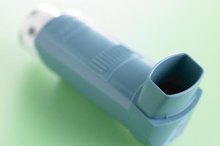What does fact checked mean?
At Healthfully, we strive to deliver objective content that is accurate and up-to-date. Our team periodically reviews articles in order to ensure content quality. The sources cited below consist of evidence from peer-reviewed journals, prominent medical organizations, academic associations, and government data.
The information contained on this site is for informational purposes only, and should not be used as a substitute for the advice of a professional health care provider. Please check with the appropriate physician regarding health questions and concerns. Although we strive to deliver accurate and up-to-date information, no guarantee to that effect is made.
How Do I Mix Prednisone With Tylenol?
It is important to know which medications can be used together, to avoid serious adverse reactions or even death. According to Drugs.com, prednisone and Tylenol can be taken together as long as the person monitors for adverse effects 1. Because Tylenol works in a completely different way than prednisone, they do not compete with each other once inside the body. Prednisone is a powerful anti-inflammatory, used for conditions such as arthritis, skin diseases and asthma. Tylenol is a pain reliever and fever reducer available over the counter.
If you are experiencing serious medical symptoms, seek emergency treatment immediately.
Talk to a doctor or pharmacist about your particular condition and how mixing Tylenol and prednisone will affect you. Be sure to tell him all of the supplements you are using, including herbal supplements and over-the-counter treatments. It is always better to be safe when dealing with medications, especially one as powerful as prednisone.
What is the Difference Between Albuterol & Pulmicort?
Learn More
Search reputable sites such as the Centers for Disease Control and the Federal Drug Administration to find information on these medications 23. Combining medications can be dangerous if you don’t do your research. Some websites will even allow you to search for drug interactions for up to three medications at a time. The Physician's Desk Reference is now available online.
Eat a small meal a half hour before taking Tylenol and prednisone 1. Tylenol, also called acetaminophen, can cause stomach upset in some people when taken on an empty stomach. According to MedicineNet.com, you should always eat something before taking prednisone, because it increases your chance of stomach lining irritation and can even cause ulcers 2.
The Side Effects of Pantoprazole Sodium 40 Mg
Learn More
Wash your hands before opening any bottle of medication 3. The Centers for Disease Control states that hand washing is the best way to prevent illness and infection, but it is often the most overlooked step 3. Hand washing is especially important when taking prednisone, because prednisone lowers your resistance to bacteria and viruses. Hand washing will prevent the transfer of possible infection from your hand to the medication, which you put in your mouth.
Take the dose of Tylenol as stated on the container and never more than recommended unless advised to do so by a doctor. Take the exact dose of prednisone as prescribed by your physician. Swallow both medications with a full glass of water to prevent choking or digestion issues.
Monitor for adverse effects, because every person’s chemistry is different, and your reaction may be different from the normally reported effects. Prednisone is a powerful corticosteroid with a higher risk of side effects than Tylenol. Fluid retention, stomach upset, excessive thirst and headaches are common side effects of prednisone and should be monitored carefully.
Report any adverse reactions to your doctor immediately. Emergency adverse reactions include: vomiting dark brown liquid, black stools, seizures and bone pain. These symptoms are uncommon, but seek immediate medical treatment if any of these reactions occur.
Tips
If taking prednisone with water irritates your throat, it can be taken with milk instead.
Warnings
Taking more than the recommended amount of Tylenol in a 24 hour time span, can greatly increase your risk of liver damage.
Related Articles
References
Tips
- If taking prednisone with water irritates your throat, it can be taken with milk instead.
Warnings
- Taking more than the recommended amount of Tylenol in a 24 hour time span, can greatly increase your risk of liver damage.
Writer Bio
Roseanne Omalacy became a published author and freelance writer in 2006. She is the author of several novels and has been published with Literary Partners Group, Alyson Publishing and "Scarlet Magazine." She is a Pittsburgh health and relationships columnist, holds a bachelor's degree in nursing from Pennsylvania State University and has over 15 years of nursing experience.









